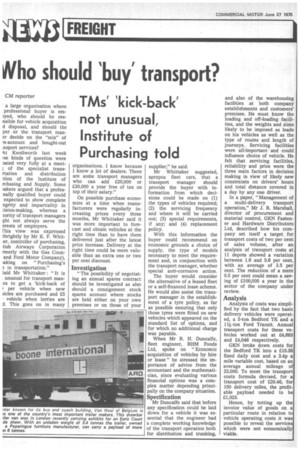Nho should 'buy' transport?
Page 16

If you've noticed an error in this article please click here to report it so we can fix it.
TMs' lick-back' not unusual, Institute of Purchasing told
CM reporter a large organisation where professional buyer is em)yed, who should be resnsible for vehicle acquisition d disposal, and should the yer or the transport maner decide on the "mix" of 'n-account and bought-out ,nsport services?
At Kenilworth last week se kinds of question were 3ated very fully at a meet; of the specialist transrtation and distribution :tion of the Institute of rchasing and Supply. Some iakers argued that a profesnally qualified buyer could expected to show complete egrity and impartiality in ision-making, whereas a lority of transport managers ght not always serve the erests of employers.
(his view was expressed thrightly by Mr K. F. Whiter, controller of purchasing, tish Airways Corporation rmerly with the Gas Counand Ford Motor Company), !aking on " Purchasing's 3 in transportation."
;aid Mr Whittaker : "It is unusual for transport manIs to get a 'kick-back of per vehicle when new tides are purchased and E5 vehicle when lorries are I This goes on in many organisations. I know because I know a lot of dealers. There are some transport managers who can add £20,000 or £30,000 a year free of tax on top of their salary."
On possible purchase economies at a time when manufacturers were regularly increasing prices every three months, Mr Whittaker said it was more important to forecast and obtain vehicles at the right time than to have them delivered just after the latest price increase. Delivery at the right time could be more valuable than an extra one or two per cent discount.
Investigation
" The possibility of negotiating an annual spares contract should be investigated as also should a consignment stock spares account where stocks are held either on your own premises or on those of your supplier," he said.
Mr Whittaker suggested, apropos fleet cars; that a transport manager should provide the buyer with information from which decisions could be made on (1) the types of vehicles required; (2) the servicing frequency and where it will be carried out; (3) special requirements, if any; and (4) replacement policy.
With this information the buyer could recommend on economic grounds a choice of supply, the type of models necessary to meet the requirement and, in conjunction with the transport manager, whether special anti-corrosive action.
The buyer would consider the alternative of a leased fleet or a self-financed lease scheme. He would also assist the transport manager in the establishment of a tyre policy, as far as possible ensuring that only those tyres were fitted on new vehicles which appeared on the standard list of options, and for which no additional charge was payable.
When Mr R. H. Duncalfe, fleet engineer, RHM Foods Ltd, spoke on "Economic acquisition of vehicles by hire or lease" he stressed the importance of advice from the accountant and the mathematician, since evaluating various financial options was a complex matter depending principally on the company situation.
Specification
Mr Duncalfe said that before any specification could be laid down for a vehicle it was essential that the engineer had a complete working knowledge of the transport operation both for distribution and trunking, and also of the warehousing facilities at both company establishments and customers' premises. He must know the loading and off-loading facilities, and the weights and sizes likely to be imposed as loads on his vehicles as well as the type of routes and length of journeys. Servicing facilities were all-important and could influence choice of vehicle. He felt that servicing facilities, reliability and price were the three main factors in decision making in view of likely new constraints on drivers' hours and total distance covered in a day by any one driver.
In a paper, "Management of a multi-delivery transport operation," Mr J. R. Marshall, director of procurement and material control, GKN Fastener and Hardware Distributors Ltd, described how his company set itself a target for transport costs of two per cent of sales volume, after an analysis of transport costs at 11 depots showed a variation between 1.6 and 5.6 per cent, with an average of 2.5 per cent. The reduction of a mere 0.5 per cent could mean a saving of £100,000 a year in the sector of the company under review.
Analysis
Analysis of costs was simplified by the fact that two basic delivery vehicles were operated, a 5-ton Bedford TK and a 1%-ton Ford Transit. Annual transport costs for these vehicles worked out at £4,683 and £4,046 respectively.
GKN broke down costs for the Bedford TK into a £15.36 fixed daily cost and a 3.4p a mile variable cost, based on an average annual mileage of 22,000. To meet the transport costs formula devised, for a transport cost of £20.46, for 150 delivery miles, the profitable payload needed to be £1,023.
Hence, by totting up the invoice value of goods on a particular route in relation to vehicle operating costs it was possible to reveal the services which were not economically viable.




















































































